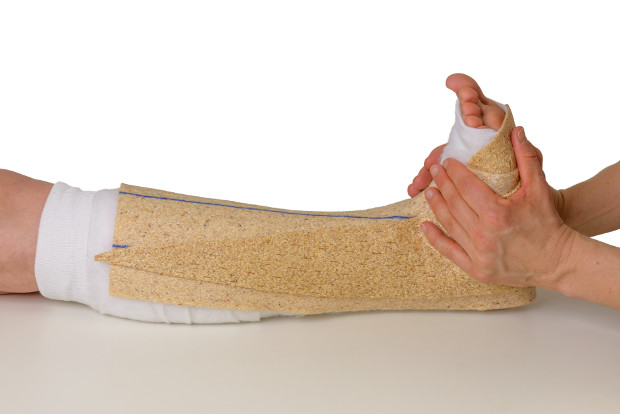Woodcast

Case - Published 4.7.2014
Made from wood and biodegradable plastic, Woodcast® is an innovative, ecological and completely non-toxic casting material. The biodegradable material can be disposed of as biowaste or energy waste.
Made from wood and biodegradable plastic, working with Woodcast is easy, fast and tidy: the heated material can be moulded using just bare hands, and the process doesn’t require any water, unlike traditional plaster-based casts. What’s more, since Woodcast is non-toxic, the user doesn’t need respiratory protection, protective gloves or local extractors, which must be used in fibreglass and plastic casting. This makes the treatment process much faster.
Woodcast ecological wood composite material is made from clean wood chippings and biodegradable plastic. In room temperature, the material is hard and durable like wood, but once heated, it becomes flexible and self-adhesive. As a biodegradable material, Woodcast can be disposed of as biowaste or energy waste, which helps to reduce the volume of waste requiring special treatment.
Thanks to its excellent mouldability, Woodcast can be perfectly moulded to fit all anatomical shapes. As a self-adhesive material, it can be used to make multi-dimensional supports of any shape by increasing the rigidity locally by applying more layers. If necessary, moulded supports can be finished by reheating. Supports made from Woodcast are X-ray transparent, which means that they do not need to be removed during imaging, unlike plaster- or fibreglass based casts. This saves both time and materials, as the cast doesn’t have to be reconstructed after imaging.
Woodcast is a versatile product that is suitable for all types of casting and for making supports to treat sprain, strain and stress injuries. The Woodcast range includes products for demanding fracture casts as well as different types of therapeutic supports.
Text and photos are from the info cards in the presentation briefcase on the Finnish forest sector. The idea of a briefcase with various kinds of samples to present this diverse sector came from the young people themselves. The briefcase has been handed out at visits to upper secondary schools.
More information on the briefcase and visits: vilma.issakainen(@)smy.fi and anne.kettunen(@)forestindustries.fi.
